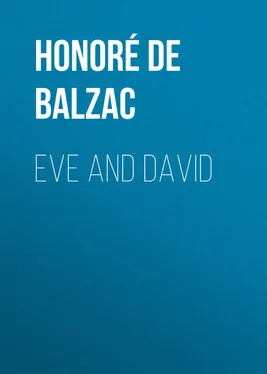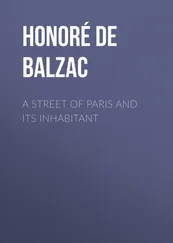Honoré Balzac - Eve and David
Здесь есть возможность читать онлайн «Honoré Balzac - Eve and David» — ознакомительный отрывок электронной книги совершенно бесплатно, а после прочтения отрывка купить полную версию. В некоторых случаях можно слушать аудио, скачать через торрент в формате fb2 и присутствует краткое содержание. Жанр: literature_19, foreign_antique, foreign_prose, на английском языке. Описание произведения, (предисловие) а так же отзывы посетителей доступны на портале библиотеки ЛибКат.
- Название:Eve and David
- Автор:
- Жанр:
- Год:неизвестен
- ISBN:нет данных
- Рейтинг книги:3 / 5. Голосов: 1
-
Избранное:Добавить в избранное
- Отзывы:
-
Ваша оценка:
- 60
- 1
- 2
- 3
- 4
- 5
Eve and David: краткое содержание, описание и аннотация
Предлагаем к чтению аннотацию, описание, краткое содержание или предисловие (зависит от того, что написал сам автор книги «Eve and David»). Если вы не нашли необходимую информацию о книге — напишите в комментариях, мы постараемся отыскать её.
Eve and David — читать онлайн ознакомительный отрывок
Ниже представлен текст книги, разбитый по страницам. Система сохранения места последней прочитанной страницы, позволяет с удобством читать онлайн бесплатно книгу «Eve and David», без необходимости каждый раз заново искать на чём Вы остановились. Поставьте закладку, и сможете в любой момент перейти на страницу, на которой закончили чтение.
Интервал:
Закладка:
Two days after the letter came, Eve was obliged to find a wet-nurse; her milk had dried up. She had made a god of her brother; now, in her eyes, he was depraved through the exercise of his noblest faculties; he was wallowing in the mire. She, noble creature that she was, was incapable of swerving from honesty and scrupulous delicacy, from all the pious traditions of the hearth, which still burns so clearly and sheds its light abroad in quiet country homes. Then David had been right in his forecasts! The leaden hues of grief overspread Eve’s white brow. She told her husband her secret in one of the pellucid talks in which married lovers tell everything to each other. The tones of David’s voice brought comfort. Though the tears stood in his eyes when he knew that grief had dried his wife’s fair breast, and knew Eve’s despair that she could not fulfil a mother’s duties, he held out reassuring hopes.
“Your brother’s imagination has let him astray, you see, child. It is so natural that a poet should wish for blue and purple robes, and hurry as eagerly after festivals as he does. It is a bird that loves glitter and luxury with such simple sincerity, that God forgives him if man condemns him for it.”
“But he is draining our lives!” exclaimed poor Eve.
“He is draining our lives just now, but only a few months ago he saved us by sending us the first fruits of his earnings,” said the good David. He had the sense to see that his wife was in despair, was going beyond the limit, and that love for Lucien would very soon come back. “Fifty years ago, or thereabouts, Mercier said in his Tableau de Paris that a man cannot live by literature, poetry, letters, or science, by the creatures of his brain, in short; and Lucien, poet that he is, would not believe the experience of five centuries. The harvests that are watered with ink are only reaped ten or twelve years after the sowing, if indeed there is any harvest after all. Lucien has taken the green wheat for the sheaves. He will have learned something of life, at any rate. He was the dupe of a woman at the outset; he was sure to be duped afterwards by the world and false friends. He has bought his experience dear, that is all. Our ancestors used to say, ‘If the son of the house brings back his two ears and his honor safe, all is well – ‘”
“Honor!” poor Eve broke in. “Oh, but Lucien has fallen in so many ways! Writing against his conscience! Attacking his best friend! Living upon an actress! Showing himself in public with her. Bringing us to lie on straw – ”
“Oh, that is nothing – !” cried David, and suddenly stopped short. The secret of Lucien’s forgery had nearly escaped him, and, unluckily, his start left a vague, uneasy impression on Eve.
“What do you mean by nothing?” she answered. “And where shall we find the money to meet bills for three thousand francs?”
“We shall be obliged to renew the lease with Cerizet, to begin with,” said David. “The Cointets have been allowing him fifteen per cent on the work done for them, and in that way alone he has made six hundred francs, besides contriving to make five hundred francs by job printing.”
“If the Cointets know that, perhaps they will not renew the lease. They will be afraid of him, for Cerizet is a dangerous man.”
“Eh! what is that to me!” cried David, “we shall be rich in a very little while. When Lucien is rich, dear angel, he will have nothing but good qualities.”
“Oh! David, my dear, my dear; what is this that you have said unthinkingly? Then Lucien fallen into the clutches of poverty would not have the force of character to resist evil? And you think just as M. d’Arthez thinks! No one is great unless he has strength of character, and Lucien is weak. An angel must not be tempted – what is that?”
“What but a nature that is noble only in its own region, its own sphere, its heaven? I will spare him the struggle; Lucien is not meant for it. Look here! I am so near the end now that I can talk to you about the means.”
He drew several sheets of white paper from his pocket, brandished them in triumph, and laid them on his wife’s lap.
“A ream of this paper, royal size, would cost five francs at the most,” he added, while Eve handled the specimens with almost childish surprise.
“Why, how did you make these sample bits?” she asked.
“With an old kitchen sieve of Marion’s.”
“And are you not satisfied yet?” asked Eve.
“The problem does not lie in the manufacturing process; it is a question of the first cost of the pulp. Alas, child, I am only a late comer in a difficult path. As long ago as 1794, Mme. Masson tried to use printed paper a second time; she succeeded, but what a price it cost! The Marquis of Salisbury tried to use straw as a material in 1800, and the same idea occurred to Seguin in France in 1801. Those sheets in your hand are made from the common rush, the arundo phragmites , but I shall try nettles and thistles; for if the material is to continue to be cheap, one must look for something that will grow in marshes and waste lands where nothing else can be grown. The whole secret lies in the preparation of the stems. At present my method is not quite simple enough. Still, in spite of this difficulty, I feel sure that I can give the French paper trade the privilege of our literature; papermaking will be for France what coal and iron and coarse potter’s clay are for England – a monopoly. I mean to be the Jacquart of the trade.”
Eve rose to her feet. David’s simple-mindedness had roused her to enthusiasm, to admiration; she held out her arms to him and held him tightly to her, while she laid her head upon his shoulder.
“You give me my reward as if I had succeeded already,” he said.
For all answer, Eve held up her sweet face, wet with tears, to his, and for a moment she could not speak.
“The kiss was not for the man of genius,” she said, “but for my comforter. Here is a rising glory for the glory that has set; and, in the midst of my grief for the brother that has fallen so low, my husband’s greatness is revealed to me. – Yes, you will be great, great like the Graindorges, the Rouvets, and Van Robais, and the Persian who discovered madder, like all the men you have told me about; great men whom nobody remembers, because their good deeds were obscure industrial triumphs.”
“What are they doing just now?”
It was Boniface Cointet who spoke. He was walking up and down outside in the Place du Murier with Cerizet watching the silhouettes of the husband and wife on the blinds. He always came at midnight for a chat with Cerizet, for the latter played the spy upon his former master’s every movement.
“He is showing her the paper he made this morning, no doubt,” said Cerizet.
“What is it made of?” asked the paper manufacturer.
“Impossible to guess,” answered Cerizet; “I made a hole in the roof and scrambled up and watched the gaffer; he was boiling pulp in a copper pan all last night. There was a heap of stuff in a corner, but I could make nothing of it; it looked like a heap of tow, as near as I could make out.”
“Go no farther,” said Boniface Cointet in unctuous tones; “it would not be right. Mme. Sechard will offer to renew your lease; tell her that you are thinking of setting up for yourself. Offer her half the value of the plant and license, and, if she takes the bid, come to me. In any case, spin the matter out… Have they no money?”
“Not a sou,” said Cerizet.
“Not a sou,” repeated tall Cointet. – “I have them now,” said he to himself.
Metivier, paper manufacturers’ wholesale agent, and Cointet Brothers, printers and paper manufacturers, were also bankers in all but name. This surreptitious banking system defies all the ingenuity of the Inland Revenue Department. Every banker is required to take out a license which, in Paris, costs five hundred francs; but no hitherto devised method of controlling commerce can detect the delinquents, or compel them to pay their due to the Government. And though Metivier and the Cointets were “outside brokers,” in the language of the Stock Exchange, none the less among them they could set some hundreds of thousands of francs moving every three months in the markets of Paris, Bordeaux, and Angouleme. Now it so fell out that that very evening Cointet Brothers had received Lucien’s forged bills in the course of business. Upon this debt, tall Cointet forthwith erected a formidable engine, pointed, as will presently be seen, against the poor, patient inventor.
Читать дальшеИнтервал:
Закладка:
Похожие книги на «Eve and David»
Представляем Вашему вниманию похожие книги на «Eve and David» списком для выбора. Мы отобрали схожую по названию и смыслу литературу в надежде предоставить читателям больше вариантов отыскать новые, интересные, ещё непрочитанные произведения.
Обсуждение, отзывы о книге «Eve and David» и просто собственные мнения читателей. Оставьте ваши комментарии, напишите, что Вы думаете о произведении, его смысле или главных героях. Укажите что конкретно понравилось, а что нет, и почему Вы так считаете.












